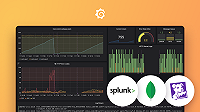Configuring URL
You can enter any URL in the query URL field. URL must be a valid JSON, CSV, GraphQL, XML, or HTML endpoint.
In the query editor, click the expand icon next the URL field to configure more query URL options like HTTP Method (GET/POST), additional headers and additional query strings.
Variables in URL
In the query URL, you can use any grafana global variables or any dashboard variables this includes from and to timestamps of the dashboard
For example,
https://example.com/path/subpath?from=${__from:date:YYYY-MM}&to=${__to:date:YYYY-MM}will produce
https://example.com/path/subpath?from=2020-01&to=2020-04Secure keys in the URL query strings
In some cases, you may need to pass the secure API keys as part of your URL. Hard-coding them in the panel is not secure. You can configure those secure keys in the datasource settings.

You can also use Api key authentication for this purpose.
Headers in the URL
You can configure the headers required for the URL in the datasource config and also in the query headers. By default infinity datasource automatically sets two headers. Header User-Agent : Go-http-client/1.1 will be set for all requests and Content-Type : application/json. You can override these headers in the datasource configuration page.
Note: We suggest adding secure headers only via configuration and not in query.
Forwarding Grafana meta data as headers / query params
From Infinity plugin version 3.0.0, You will be able to forward grafana meta data such as user id, datasource uid to the outgoing requests via Custom HTTP Headers / URL Query parameters* from the datasource settings page. In the datasource URL section, you can add any number of custom headers / query parameters with their own values. The values can include following macros which will be interpolated into actual value from the request context.
Note: Certain macros such as
${__user.login}won’t be available in the context of alerts, recorded queries, public dashboards etc.
Allowed Hosts
Leaving blank will allow all the hosts. This is by default.
If your data source needs to allow only certain hosts, configure the allowed host names in the config. There can be multiple hosts allowed. Host names are case sensitive and needs to be full host name. Example: https://en.wikipedia.org/



